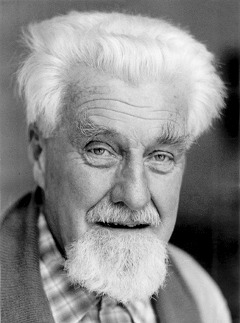| Konrad Lorenz  Born: 7-Nov-1903 Born: 7-Nov-1903
Birthplace: Vienna, Austria
Died: 27-Feb-1989
Location of death: Altenburg, Austria
Cause of death: Kidney failure
Remains: Buried, St. Andrae Woerdern Cemetery, Wordern, Austria
Gender: Male
Race or Ethnicity: White
Sexual orientation: Straight
Occupation: Zoologist Nationality: Austria
Executive summary: Founder of modern ethology Military service: German Army (infantry physician, 1942-48) Austrian zoologist Konrad Lorenz showed that in young geese, ducks, and numerous other species, there is a short window of time in which a young animal will bond with a substitute mother in the place of its biological mother, even if that substitute mother is of a different species. Called imprinting, Lorenz used this phenomenon to teach young birds to accept him as their "mother". He also developed the concept of fixed-action patterns, in which an animal will respond to specific trigger events in a genetically pre-ordained manner, with its "instructions" lying dormant unless and until the trigger event occurs.
Both his parents were physicians, and their son was allowed to indulge his fascination with animals; his childhood pets and study subjects included birds, crustaceans, dogs, insects, reptiles, rodents, and monkeys. In the late 1930s and '40s he aligned himself with the Nazis and sprinkled anti-Semitic ideas throughout at least one of his scientific papers. He wrote his first book, Das Sogenannte Böse (On Aggression), while held prisoner of war by the Russians during and after World War II.
Later in his career he showed that wolves have, in a sense, a humanity humans lack in war-time, as even in a seeming battle to the death between wolves, the losing animal makes motions acknowledging defeat and the victorious animal will yield, allowing the loser to walk away. He won the Nobel Prize for Medicine in 1973, though some of his ideas, including the theory that much of human behavior is instinctive, remain controversial long after his death. Father: Adolf Lorenz (orthopedic surgeon, b. 1854, d. 1946)
Mother: Emma Lecher (physician, b. 1862, m. 1884, d. 1936)
Brother: Albert (b. 2-Sep-1885)
Wife: Margarethe Gebhardt ("Gretl", gynecologist, m. 1927, three children)
Daughter: Agnes
Daughter: Dagmar
Son: Thomas
University: Columbia University (two semesters in 1922)
Medical School: MD, University of Vienna (1928)
University: PhD Zoology, University of Vienna (1933)
Professor: Animal Psychology, University of Königsberg (1939-42)
Administrator: Max Planck Institute for Behavioral Physiology, Seewiesen, Austria (1955-73)
Nobel Prize for Medicine 1973 (with Karl von Frisch and Nikolaas Tinbergen)
Austrian Academy of Science Director of Animal Sociology (1973-89)
Max Planck Society for the Advancement of Science
National Socialist German Workers Party
Royal Society Foreign Member, 1964
Taken Prisoner of War by Soviets, 1944-48 (WWII)
Author of books:
Das Sogenannte Böse (On Aggression) (1948)
Er Redete Mit dem Vieh, den Vögeln und den Fischen (King Solomon's Ring) (1949)
So kam der Mensch auf den Hund (Man Meets Dog) (1950)
Antriebe Tierischen und Menschlichen Verhaltens Gesammelte Abhandlungen (Studies in Animal and Human Behavior) (1968)
Die Rückseite des Spiegels (Behind the Mirror: A Search for a Natural History of Human Knowledge) (1973)
Die acht Todsünden der zivilisierten Menschheit (Civilized Man's Eight Deadly Sins) (1974)
Vergleichende Verhaltensforschung: Grundlagen der Ethologie (The Foundations of Ethology) (1978)
Der Abbau des Menschlichen (The Waning of Humaneness) (1983)
Rettet die Hoffnung (Save the Hope) (1988)
Hier bin ich — wo bist du?: Etholgie der Graugans (Here Am I — Where Are You?: The Behavior of the Greylag Goose) (1988)
Die Naturwissenschaft vom Menschen (The Science of Man) (1992, posthumous)
Requires Flash 7+ and Javascript.
Do you know something we don't?
Submit a correction or make a comment about this profile
Copyright ©2019 Soylent Communications
|